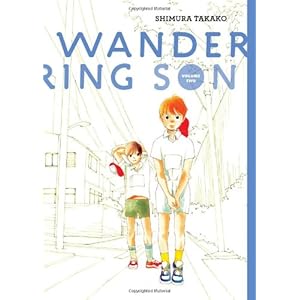 There is a girl, she is in love with another girl. The other girl loves her back. They love each other. The end.
There is a girl, she is in love with another girl. The other girl loves her back. They love each other. The end.
It’s that simple, right? The story ends with “Happily Ever After” and we move on to the next story, and never think about the characters after that moment.
This is the essence of “Story A” – the girl and the girl ride off into the sunset and nothing bad ever happens to them.
However.
Humans are not like that, Love is not like that. Friendship is not like that. Life is not like that.
If you have ever fallen in love with someone you know what I’m saying. ^_^; “Love hurts” isn’t a joke, it’s a reality.
In Aoi Hana, Volume 7, love hurts. Even as these girls we’ve come to care about move into their final year of high school, right on the edge of being adults, they are facing some issues they have to deal with. These issues are things that, one way or the other, will bring them that much closer to maturity. Sex is part of this, but it’s just part. Communication is a larger, much more intangible and difficult to grasp, part.
Kyouko needs to find her way with her fiance’, Kou. Their relationship is complicated by their betrothal, their actual feelings for one another and, most impenetrably, Kyouko’s mother.
Mogi’s relationship with Shinobu takes a shocking turn. Will they be split apart by their own lack of confidence or will they find their way?
At the very beginning of the volume, Haru mentions that her sister and teacher have “gotten married” – although it was not a legally binding ceremony, it was meaningful for them…and she lets us know how her parents coped (or didn’t.) Same-sex marriage in manga. I want to hug Shimura-sensei and Morishima-sensei and any other mangaka who surfaces this issue in a manga.
Most important for us, there’s Akira and Fumi. Fumi is in love with Akira, but she is convinced that Akira does not feel the same way about her. Akira can see Fumi is in love with her – and she does not want to stand in the way of Fumi’s happiness, but she has no idea at all what would make *herself* happy.
Fumi thought she got what she wanted, but Akira’s lack of honesty is subtle poison. Fumi’s not as happy as Akira thought she should be after having given herself entirely to her dearest friend. Although physically they’ve been as close as possible, emotionally, they are more distant than ever before.
Many fans have wanted this relationship since the beginning. This volume is very likely to make those fans profoundly unhappy. I have never numbered myself among those who wanted Fumi and Akira as a couple. This relationship is a perfect example of what happens when you get what you want, but not what you need. IMHO, the best of all possible results is that they end the relationship quickly, with no regrets and as few tears as possible, then patch together what remains of their friendship before that too dissolves. This was not the path that leads to a happy ending, they need to return to the fork in the road and choose another.
Against a backdrop of writing, creating and performing the Three Musketeers for the drama competition, this series eschews conventions of manga for realism. Thank heavens.
Ratings:
Story – 10
Characters – 10
Art – 10
Lesbian Life – 10
Service – 3
Overall – 10
There is a girl, she loves another girl. That girl is not sure she loves her back. The end?





